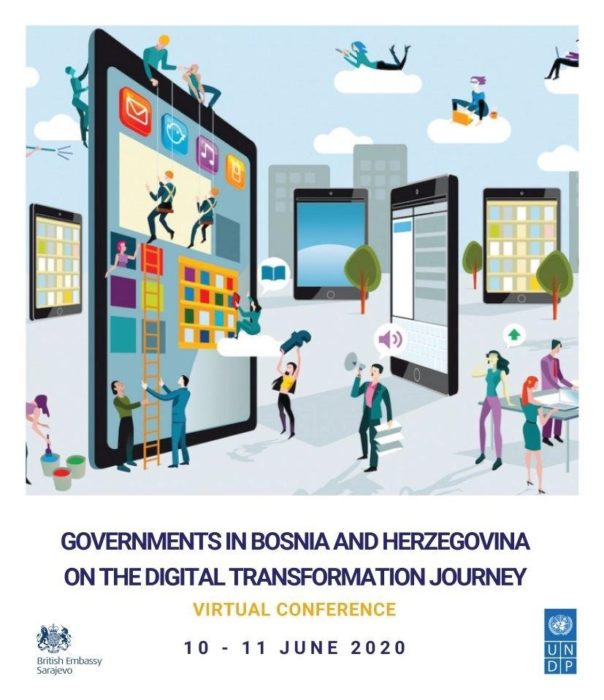In the time of the Fourth Industrial Revolution, technologies such as Artificial Intelligence, blockchain, virtual reality, big data, and many more are now transforming societies, economies, institutions and businesses across the globe. Governments worldwide are strategically leveraging new technologies to fundamentally improve policies, decision-making, public services and systems.
Yet the full potential of digital government worldwide, including in Bosnia and Herzegovina, remains largely untapped. Global practice shows that to build a public sector fit for the future, governments must “reinvent” themselves. Digital transformation is not just about new technologies, but requires an overhaul of organizational structures, work processes, skills, culture and mindset. This applies not only to governments but also to society, institutions and the private sector in Bosnia and Herzegovina.
In February 2020, the British Embassy in Bosnia and Herzegovina and UNDP together initiated a public conversation around digital transformation in the public sector. A lot has happened in the intervening 4 months. In this short time we have seen many examples in BiH and globally that demonstrate how education and other public services have introduced huge digital transformation changes over a few short weeks. Necessity brought about more progress than we had seen in years. Using technology for communication and digital tools proved less difficult than imagined. The COVID-19 pandemic has been difficult for all, and there are many lessons to learn. One positive outcome is the acceleration of e-governance in BiH.
What are the main pathways for strategic and effective digital transformation of governments in Bosnia and Herzegovina?
Firstly, policy-makers need to put in place a whole-of-government vision for digital transformation, supported by an adequate policy, regulatory and institutional environment that enables fast and tangible change. Such a vision can be guided by the principles and direction set by the eEurope 2020 Strategy and the Digital Agenda 2020.
Secondly, public service needs to build its digital skills and welcome innovation as one of its progressive policy-design and service delivery tools.
Thirdly, authorities need to step up efforts towards more inclusive, fair and people-centred e-government and e-services. Everyone in BiH should benefit from this transformation, including society’s most disadvantaged. This is how governments will become “a click away from the citizens and businesses”.
Last but not least, we believe that knowledge sharing and networking is critical for fostering change and fuelling ideas, experience and inspiration across the public sector. Last week, during a 100% digital online conference attended by many not only from across BiH but also well beyond its borders, the British Embassy and UNDP floated the establishment of a digital governance practitioners’ network in Bosnia and Herzegovina. As of this week, more than 150 policy leaders and public servants have expressed interest in joining the Network, a very welcome show of enthusiasm.
We are committed to work with all partners at all levels of the BiH public sector, to help support its digital transformation as fast as possible. Let’s build this future together.
Blog post by Steliana Nedera, UNDP Resident Representative in Bosnia and Herzegovina and Matt Field, Ambassador of the United Kingdom of Great Britain and Northern Ireland in Bosnia and Herzegovina








